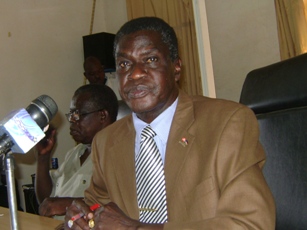South Sudanese rebels hail growing calls for federalism within ruling SPLM
July 19, 2014 (ADDIS ABABA) – The rebel Sudan Peoples’ Liberation Movement in Opposition (SPLM-In-Opposition) led by the former vice-president, Riek Machar, has hailed the growing internal calls for federalism by senior officials of president Salva Kiir’s government, but said there are challenges in making such demands under “dictatorial leadership.”

President Kiir earlier warned government officials not to embrace the idea of a federal system of governance which he described as “divisive” and a mere tactical position by the rebel leader Riek Machar to split and dismantle the “internal front.”
However, governors of the three states of the former greater Equatoria region came out openly in defiant of the president’s interpretations of federalism and reiterated their commitment to a federal system as resolved in previous subsequent conferences by intellectuals and politicians from the region.
On Tuesday, governor Konga stepped up the fight by taking it to the state parliament in Juba in which he told the lawmakers to go to their respective constituencies and enlighten the people on the values and benefits that the citizens can gain from adopting federalism in South Sudan.
“We must inform our people in Central Equatoria and the country at large on the values and benefits of this system of governance that ensures equitable distribution of national resources and sharing of state powers by all the different regions, states and ethnic groups to develop and render effective services to the people,” Konga told the parliament.
The governor also briefed the lawmakers on his recent tour to a number of the state counties including Yei and Morobo during which he enlightened the citizens on the importance of federalism and state government’s stance to support it.
The speaker of the state legislature, Naphtale Hassan, echoed the governor’s remarks, saying federalism is not “kokora” – a word for Equatorian particularisation in 1980s – stressing that the system needed to be explained to the people.
The state’s top executive official said he would also establish more FM radio stations in the various state counties to educate citizens about the true nature of federal system of governance.
He further criticised the national government for allegedly not protecting the citizens, citing the ongoing insecurity on Juba-Nimule road in which armed groups attack commuters on the way.
The governor vowed to establish state security committee and taskforce of police forces to provide security and protection for the citizens in the state.
SUPPORT FOR FEDERALISM
The rebel faction of the SPLM-In-Opposition said they hailed the growing internal demand for federalism but said challenges were obvious.
“Our leadership always wave to such internal courageous growing support to the calls for federalism. We however understand there are obvious challenges because the regime does not tolerate democratic, free political debates,” Machar’s spokesperson, James Gatdet Dak, told Sudan Tribune on Saturday.
He said it was necessary for the proponents of federalism to join the armed resistance movement under Machar in order to exert effective pressure on the top leadership of the government.
Dak further accused the government of intimidating and murdering citizens who dared to express their opinions about federalism, adding that even foreigners paid the price of the lawlessness, citing this week’s killing of a Kenyan citizen inside his house in Juba.
WRONG INFORMATION
Governor Konga in his statement to the state parliament on Tuesday described president Kiir’s recent remarks on federalism as “false” information intended to create divisions.
“As you heard the speech of the president during the 9th of July, it was unfortunate that the president of the republic had been fed with wrong information,” Konga told the lawmakers.
President Kiir on the third anniversary of South Sudan’s independence attacked federalism which he equated to kokora in the 1980s, saying only the people of Central Equatoria were left in Juba as they chased away even other Equatorians and warned that the same situation would happen if federalism was adopted in the young country.
Konga, ethnically from Mundari tribe and was rumoured last month to have defected to the rebels, returned to Juba after two weeks of absence and spoke on FM radios in the capital in which he criticised the government for abandoning forces recruited from the Mundari ethnic group. He said they were left to starve and not provided with basic needs.
About 6000 youth from Mundari were reportedly recruited, trained and armed through the help of the governor after the 15 December crisis in order to fight against the rebels, which they have not done after they were heavily armed while stationed in their home county of Terekeka.
(ST)
